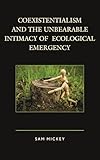Coexistentialism and the unbearable intimacy of ecological emergency / Sam Mickey.
Material type: TextSeries: Ecocritical theory and practice: Publisher: Lanham : Lexington Books, [2016]Description: viii, 251 pages ; 24 cmContent type: text Media type: unmediated Carrier type: volumeISBN: 9781498517652 (cloth : alk. paper); 149851765X (cloth : alk. paper)Subject(s): Existentialism | Human ecology | Existentialism | Human ecologyAdditional physical formats: Online version:: Coexistentialism and the unbearable intimacy of ecological emergencyDDC classification: 142/.78 LOC classification: B819 | .M535 2016
TextSeries: Ecocritical theory and practice: Publisher: Lanham : Lexington Books, [2016]Description: viii, 251 pages ; 24 cmContent type: text Media type: unmediated Carrier type: volumeISBN: 9781498517652 (cloth : alk. paper); 149851765X (cloth : alk. paper)Subject(s): Existentialism | Human ecology | Existentialism | Human ecologyAdditional physical formats: Online version:: Coexistentialism and the unbearable intimacy of ecological emergencyDDC classification: 142/.78 LOC classification: B819 | .M535 2016| Item type | Current library | Call number | Copy number | Status | Notes | Date due | Barcode |
|---|---|---|---|---|---|---|---|
 Books
Books
|
Female Library | B819 .M535 2016 (Browse shelf (Opens below)) | 1 | Available | STACKS | 51952000335863 | |
 Books
Books
|
Main Library | B819 .M535 2016 (Browse shelf (Opens below)) | 1 | Available | STACKS | 51952000335870 |
Browsing Female Library shelves Close shelf browser

|

|

|

|

|

|

|
||
| B809.2 .C65 2009 Critical thinking unleashed / | B809.2 .P38 2012 Critical thinking : tools for taking charge of your learning and your life / | B809.3 .H58 2008 Theory for classics : a student's guide / | B819 .M535 2016 Coexistentialism and the unbearable intimacy of ecological emergency / | B828.45 .S4713 2016 The five senses : a philosophy of mingled bodies / | BC175 .D35 2009 Attacking faulty reasoning : a practical guide to fallacy-free arguments / | BC175 .D35 2009 Attacking faulty reasoning : a practical guide to fallacy-free arguments / |
Includes bibliographical references (pages 233-245) and index.
Renewing existentialism -- Existentialist legacies -- After God, after nature -- Remaining exposed -- Roundness -- Interlude -- After humanism -- Looking good -- Becoming worldly -- Askesis: shut up and train! -- Indications of an axial age -- Coda.
"The philosophy of existentialism is undergoing an ecological renewal, as global warming, mass extinction, and other signs of the planetary scale of human actions are making it glaringly apparent that existence is always ecological coexistence. One of the most urgent problems in the current ecological emergency is that humans cannot bear to face the emergency. Its earth-shattering implications are ignored in favor of more solutions, fixes, and sustainability transitions. Solutions cannot solve much when they cannot face what it means to be human amidst unprecedented uncertainty and intimate interconnectedness. Attention to such uncertainty and interconnectedness is what "ecological existentialism" (Deborah Bird Rose) or "coexistentialism" (Timothy Morton) is all about. This book follows Rose, Morton, and many others (e.g., Jean-Luc Nancy, Peter Sloterdijk, and Luce Irigaray) who are currently taking up the styles of thinking conveyed in existentialism, renewing existentialist affirmations of experience, paradox, uncertainty, and ambiguity, and extending existentialism beyond humans to include attention to the uniqueness and strangeness of all beings--all humans and nonhumans woven into ecological coexistence. Along the way, coexistentialism finds productive alliances and tensions amidst many areas of inquiry, including ecocriticism, ecological humanities, object-oriented ontology, feminism, phenomenology, deconstruction, new materialism, and more. This is a book for anyone who seeks to refute cynicism and loneliness and affirm coexistence"--The publisher.
1 2

There are no comments on this title.